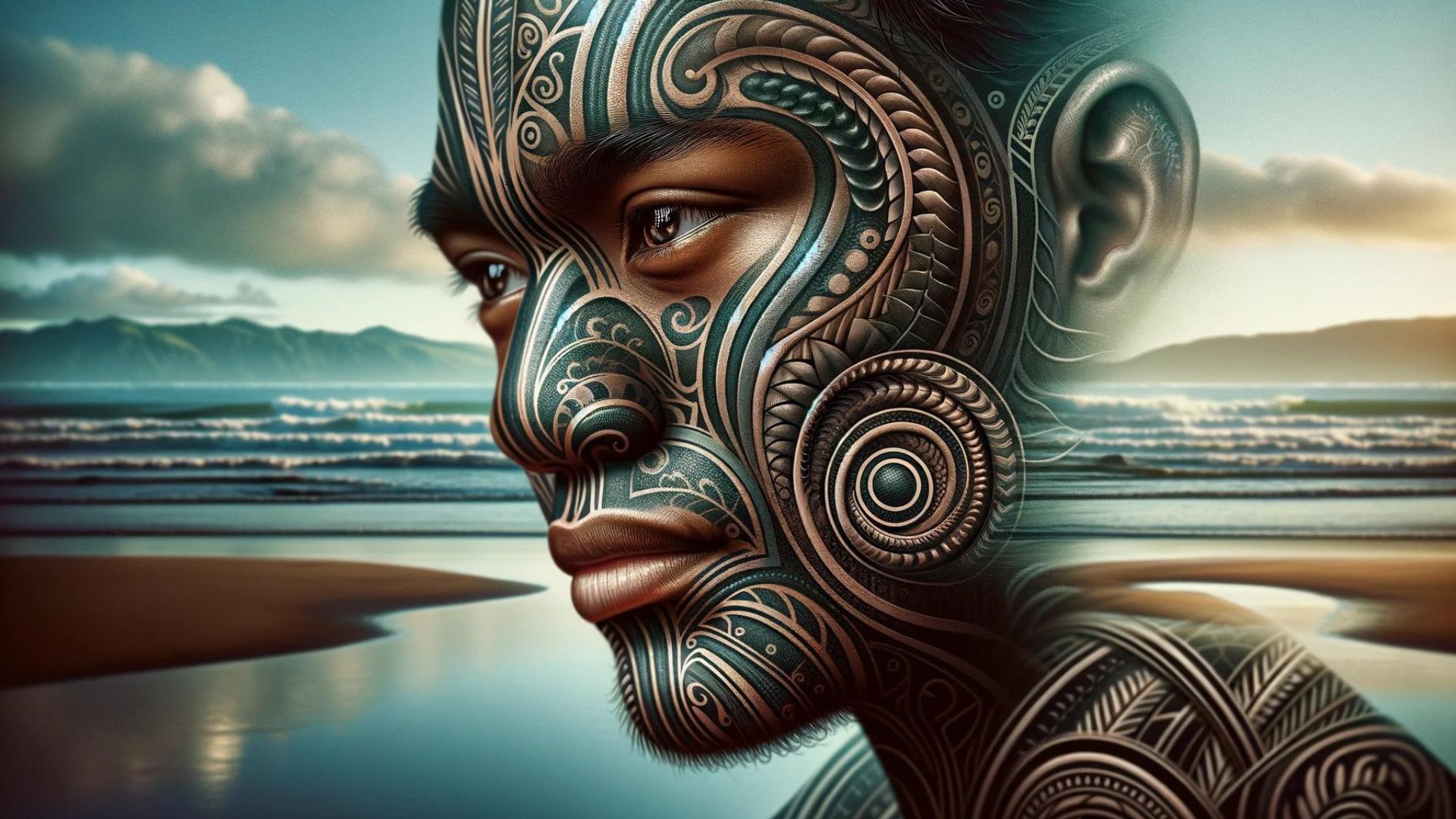More Than Just Ink: Tā Moko
Imagine gazing at a warrior’s face adorned with swirling lines and spirals. This isn’t just body art; it’s a biography etched on skin.
Tā moko, the traditional Māori tattooing practice, holds profound spiritual and cultural significance:
- Identity Card: Every design is unique, telling stories of ancestry, social status, achievements, and personal history.
- Rite of Passage: Receiving tā moko marked significant life events, particularly the transition from childhood to adulthood.
- Sacred Practice: Tattooing was a tapu (sacred) process, performed by skilled tohunga tā moko (tattoo artists) with rituals and prayers.
- Resilience and Beauty: The traditional method using chisels created deeply textured scars, a testament to the wearer’s strength and determination.
Symbols Speak Louder Than Words
Māori tattoos aren’t random patterns. Each curve and line holds meaning:
- Koru: A spiral based on an unfurling fern frond, representing new beginnings, growth, and connection to nature.
- Mangopare: A hammerhead shark design symbolizing strength resilience, and determination.
- Ahu Ahu Mataroa: Elongated lines emphasizing facial features, signifying prestige and social rank.
Revival and Respect
Like many indigenous traditions, tā moko almost disappeared under the weight of colonization. But in recent decades, it has experienced a powerful resurgence, reclaiming a vital part of Māori identity.
It’s important to remember:
- Not a Fashion Trend: Tā moko is deeply connected to Māori whakapapa (genealogy). Appropriating designs without understanding their context is disrespectful.
- Admire, Don’t Copy: Appreciating the artistry is great. Getting inked with a meaningful Māori design if you’re not of Māori heritage is not.
- Seek Authentic Experiences: If traveling to New Zealand, learn about tā moko through cultural centers, guided tours, or demonstrations led by Māori artists.
Why This Matters
Learning about traditions like tā moko expands our worldview in several ways:
- Breaking Stereotypes: It challenges simplistic ideas about other cultures, revealing a richness and depth we might otherwise miss.
- Respect and Understanding: Understanding why something is sacred to others fosters empathy and helps break down cultural barriers.
- Own Heritage: Exploring other traditions often sparks a desire to understand more about our own roots and identities.
Take Action
- Research: Delve deeper into Māori culture through online resources or books. Many Māori organizations have websites sharing knowledge.
- Support: Find ethical businesses owned by Māori artists and purchase their work when possible.
- Open Your Mind: What traditions in your own community or others around the world ignite your curiosity? Take the leap to learn more!
The intricate designs of tā moko tell a story about resilience, connection to the land, and the power of tradition. By opening ourselves to understanding different ways of being, we create a more vibrant and interconnected world for everyone.
Why Should You Care?
- Global citizenship: Understanding diverse cultures fosters empathy, respect, and a broader perspective on the world.
- Combatting stereotypes: Learning about the deep meaning behind practices like tā moko helps replace surface-level judgments with appreciation and understanding.
- Preservation of heritage: Taking an interest in traditional practices supports efforts to keep these important cultural expressions alive for future generations.
Key Takeaways
- Māori tattoos (tā moko) are more than just body art: They are visual representations of a person’s identity, genealogy, and life journey.
- The process of tā moko is deeply spiritual and significant: It is a sacred practice traditionally involving rituals and skilled artists.
- Designs carry symbolic meaning: Every element of a tā moko reflects aspects of personal history and cultural symbolism.
- Colonization threatened tā moko, but it has seen a strong revival: This is a symbol of the resilience of Māori culture.
- Appreciation must go beyond aesthetics: Respectful engagement means avoiding appropriation of designs or treating tā moko as a fashion trend.
Keywords
- Māori: Indigenous Polynesian people of New Zealand.
- Tā moko: Traditional Māori tattooing.
- Aotearoa: Māori name for New Zealand, meaning “the land of the long white cloud.”
- Identity: A person’s sense of self, including aspects like ancestry, culture, and personal history.
- Rite of Passage: A ceremony or event marking an important transition in life.
- Tapu: A Polynesian concept referring to something sacred or forbidden.
- Tohunga tā moko: Skilled Māori tattoo artist.
- Symbolism: The use of symbols to represent ideas or qualities.
- Colonization: The act of one country establishing control over another, often impacting the indigenous population’s culture.
- Cultural Appropriation: Taking elements of a culture by outsiders without understanding or respecting their original meaning.
Frequently Asked Questions
- Can non-Māori people get tā moko inspired tattoos? This is a complex issue and opinions differ. Many believe it’s disrespectful unless there’s a genuine connection to Māori culture. Consider a non-Maori design inspired by nature instead.
- How painful is tā moko? Traditionally, it was far more painful than modern tattooing as it involves carving into the skin. Today, some artists offer a blend of traditional and machine methods.
- Where can I learn more about Māori culture respectfully? Seek out resources from Māori-run cultural centers, websites of Māori organizations, museums, and reputable books.
Myth Buster
- Myth: Māori tattoos are primitive or tribalistic.
- Reality: Tā moko is a highly sophisticated art form with a rich symbolic language and deep cultural significance.
Let’s Talk
- Have you encountered traditions from other cultures that fascinated you? What did you learn from the experience?
- How can we balance appreciating other cultures while avoiding disrespectful appropriation?
- If you could learn about one tradition from any culture, what would it be?
Share your thoughts in the comments below!












0 Comments